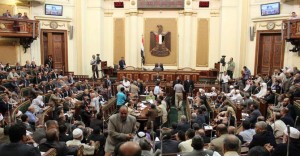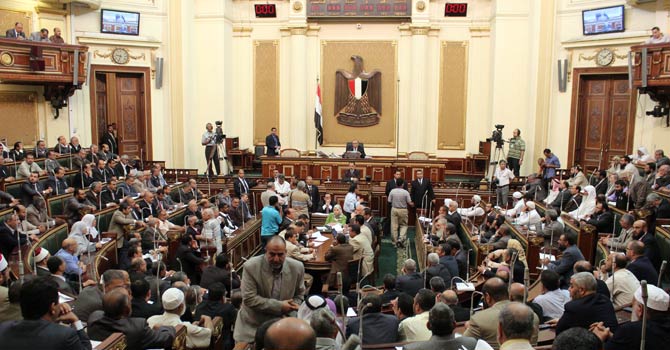
(AFP File Photo)
The same names that drafted the unconstitutional law will be responsible for amending it to abide by the Supreme Constitutional Court’s (SCC) ruling.
Amendments to the law are set to feature changes in the districts and number of seats.
Egypt’s cabinet issued a decree on Monday to form the committee that will amend the electoral districts law that the SCC ruled unconstitutional.
The SCC ruled the law unconstitutional on Sunday, resulting in the postponement of parliamentary elections until the questioned law is amended.
The Administrative Court announced Tuesday the annulment of elections procedures taken by the Supreme Electoral Committee (SEC).
The SCC, while it announced that Article 3 of the electoral districts law is unconstitutional, refused other appeals on the law defining political rights issued ahead of last May’s presidential elections.
It also refused appeals on the law organising the establishment of the parliament. Both laws were passed by former interim president Adly Mansour.
The SEC announced, following the court ruling, that the elections will be postponed pending amendments to the districts law.
The cabinet selected a committee to amend the law that includes: the prime minister’s advisor on security and elections; the Minister of Justice’s assistant for legislation; the Minister of Interior’s assistant for legal affairs; and two law professors from Ain Shams and Mansoura universities.
It is the same committee that drafted the initial law.
President Abdel Fattah Al-Sisi instructed the government to proceed with legislative amendments to the electoral law to abide with the SCC’s ruling within a month, according to a presidential statement.
The explanations of the SCC’s ruling make it easy to amend the law, former dean of Faculty of Law at Cairo University Mahmoud Kebaish told Daily News Egypt. Kebaish added that the one month timeframe, which Al-Sisi and the cabinet asked the committee to amend the law within, is fair.
“The SCC’s ruling specified the way to amend the law in order to become constitutional,” he said.
The constitutional law expert added that proportional equity has to be achieved in dividing the country into districts, in matters of space and population, for the law to become constitutional. “It is impossible to achieve perfect equity, but as much as possible,” he said.
The law was mainly contested on claims that it violated constitutional guarantees for equal and fair representation. These include the allocation of parliamentary seats to each electoral constituency, and the expenses allowed for electoral campaigns, which are set to a maximum of EGP 500,000.
The Article 3 that the court ruled unconstitutional defines electoral districts for the individual system seats.
Kebaish said the committee’s work in amending the electoral districts law will feature changes to the number of districts and seats in Egypt’s next parliament.
“Some districts will be merged and others will be divided to achieve proportional equity between space and population of districts,” Kebaish said. “According to that the number of seats will change.”
According to the roadmap put in place following the ouster of former president Mohamed Morsi, parliamentary elections were supposed to take place before presidential elections. But in January 2014, interim president Adly Mansour announced an amendment in the order of elections, which saw Al-Sisi’s inauguration in June.
The government has tried to push for elections to be held in March to help convince the international community of Egypt’s progress with a democratic political transition. It was hoped that the elections would have occurred before the Economic Summit later on this month.
